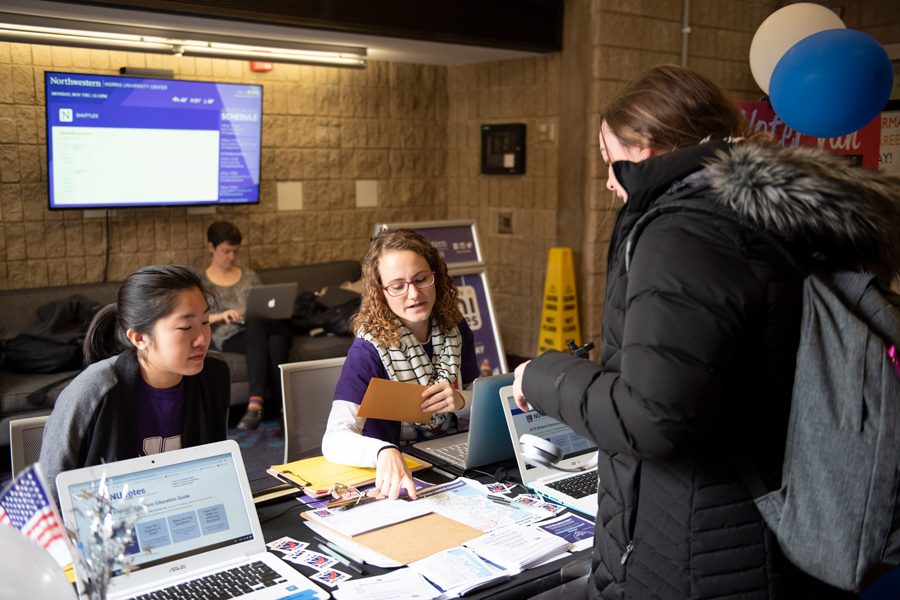A small number of students may need ballot notarizations. Here’s where you can do that.
Daily file photo by Colin Boyle
An NU Votes staffer asks a student to fill out a form at the voter van table. According to the group’s website, the Center for Civic Engagement and Office of the Registrar both provide ballot notarizations.
October 11, 2020
As the pandemic continues to interrupt life, experts predict about 80 million mail ballots will be sent this fall — over double the number returned four years ago.
But if you’re voting absentee in Missouri, Oklahoma, Mississippi or Minnesota, you might need a notary, Rob Donahue, interim director of Northwestern’s Center for Civic Engagement, told The Daily.
Key word: might.
Most states do not require a notary. According to the NU Votes website, if a ballot requires a notary, that means a “registered third party known as a notary public must verify your identity, witness you signing the document, and sign the document themselves, affixing their official notary stamp.”
The issue is “kind of hazy,” Donahue said, with some “wiggle room” for when a ballot needs to be notarized.
“We don’t expect a huge need for notaries,” Donahue said. “There’s not a ton of states that require it, and those numbers have been going down as a result of the pandemic.”
For example, those voting absentee in Minnesota can have any registered Minnesota voter serve in lieu of a notary. “If both you and your spouse or roommate are voting by absentee ballot, you can serve as each other’s witnesses,” a video from the Minnesota Commission of Deaf, DeafBlind and Hard of Hearing explains.
Oklahoma voters may attach a copy of a valid ID to the affidavit envelope instead of using a notary. And “physically incapacitated voters” and those at high risk from COVID-19 can use two witnesses in place of notarization, according to the National Notary Association.
The association notes Mississippi has the strictest requirements for voting absentee. Voters with a “temporary or permanent physical disability” may have their ballot witnessed and signed by anyone over 18 years old as an alternative.
The Missouri Supreme Court recently upheld the notary requirement for most mail-in ballots. Missouri voters can send in “absentee ballots” if they can’t go to the polls due to absence from their jurisdiction, incapacity or confinement, religious belief or incarceration, among other reasons. Those voters will need a notary’s signature, save for a few exceptions, including permanent disability, illness or physical disability. Those who have contracted COVID-19 or are in an at-risk category do not need a notary’s signature.
Northwestern has historically had high levels of voter participation. Over 90 percent of eligible undergraduate and graduate students were registered to vote in 2016 and nearly two-thirds of eligible students ultimately voted that year.
To continue that success and ensure notary services remain accessible, Donahue said Katrina Weimholt, the assistant director of the Center for Civic Engagement, recently became a notary.
“We want to make sure people know this service is there,” Donahue said. “But we also want to not intimidate people… because the vast majority of Northwestern students are not going to need that service.”
For students who do need the service, here’s a list of other locations on and around the Evanston campus providing ballot notarizations:
Center for Civic Engagement
Office of the Registrar
Illinois Currency Exchange
Byline Bank, Chase Bank, and Evanston Community Bank & Trust may also provide services, though only for account holders, according to NU Votes’s website.
Donahue emphasized that the Center for Civic Engagement can be a “first point of contact” for anyone with questions about ballot notarizations or other voting needs. Students can contact the office at [email protected] or attend its drop-in hours to get help.
“Because of the nature of this election and because of all the changes that are happening as a result of COVID, there are fewer students that are going to need notary support,” Donahue said. “Folks should make sure to read the instructions very diligently.”
Email: [email protected]
Twitter: @pamesjollard
Related stories:
— NU stresses voting and civic engagement ahead of November election
— Northwestern voting participation more than doubled in 2018 midterm elections


